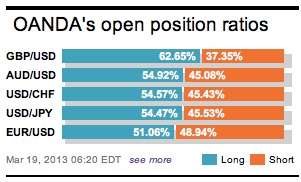A little handholding and a little coaxing can go a long way. This market has checked some of their fevered emotions and taken their foot off the panic pedal with a little help from Euro policy makers. Capital Markets are relatively calm thus far, as investors digest the latest updates from Cyprus and the possible implication of a depositor ‘tax’ as part of its bailout program.
Yesterday they voted to vote later. Later this morning the Cypriot parliament is expected to vote on the bailout measures, including the depositor levy. Behind the scenes there are ongoing discussions on softening the burden for smaller deposits, in an attempt to make the measure more politically palatable and economically enticing. This is certainly a tense time for Europe. Their handling of a potential explosive situation has been poor; so much so that they have even angered the biggest of all ‘bears’ the Russians.

The political situation is fragile and all outcomes are possible. The market is tilting towards a deal being approved. Obviously, event risks remain as the vote could be postponed again. Yesterday’s market price action has probably already priced in a “yes” vote, leading to a modest market impact, whereas a “No,” could reignite another large risk-off reaction. For now, Cyprus will remain the 17-member currency driver. A negative vote from the Cypriot parliament would likely trigger a negative reaction for the EUR. Euro policy makers view Cyprus as a “special” case, so special that contagion risks would likely be contained – only time will see if they are correct.
If you discarded financial implications then Europe is a social ticking time bomb. Investors should now be expecting rating agency’s again to find their voices. The Cypriots citizen stance suggests that the Euro-peripheries, Spain, Italy and Portugal could possibly see a higher risk that neither of these countries will be able to carry through necessary reforms as the unemployed become less willing to put up with austerity. Policy makers are a long way socially, economically and politically from finding a secure solution for the Euro situation. Too many cuts and not enough band-aids is the problem.

The UK budget and the BoE minutes will keep sterling traders busy over the next couple of sessions. Annual inflation in the UK for February accelerated to its highest level in 10-months this morning (+2.8%). This does not make the BoE task any easier in trying to nurse the triple-dip economy back to health. The rise in inflation in theory should limit policy makers from printing more money to buy bonds, but will it? The time has come to be more innovative. The BoE has already communicated that inflation will remain elevated and sticky until at least 2016. This should open the door for the BoE to be more aggressive with its easing via QE or FLS.
Both tomorrow’s UK Budget and Bank of England minutes will be significant. The market does not expect any noteworthy fiscal expansion in the Budget, but there may be measures with regard to the FLS or banking sector. Again the BoE minutes are anticipated to be a close call after the decision not to extend QE earlier this month. Any surprise fiscal innovative moves in the UK budget could increase the risk of “ratings” action. When combined with the risk of an increase in Asset Purchases and the Bank’s tolerance towards “high-inflation,” are factors that should undermine the sterling’s medium term value.
Again, German data is considered the dominant indicator this morning. The sharp improvement in the German ZEW expectation index (48.5 from 48.2) is trying to lend support to the EUR. The current conditions index came in at 13.6, much stronger than the 5.2 print in February. The data only confirms that German remains the dominant economy amongst the Euro-zone members. However, Euro outlook remains uncertain as the euro-zone crisis is trying to make a comeback!
The -2% single currency decline witnessed over the weekend was in danger of recouping much of its loss under investor’s noses. Has the safe haven Yen buying now ended? The market got itself caught long EUR’s on the initial downdraft and is now in danger of doing the exact opposite with the EUR and especially the Yen, as they fill in that gap created on the first move. This should provide some relief for PM Abe and his fellow weak Yen cohorts. The EUR’s resilience to Cyprus news is probably not a strong enough reason to buy it whole heartily. This week’s market shock should have Bernanke giving us his reassuring dovish speech.

Just on fundamentals alone and before last weekend, the Euro-zone looked a poor bet against the “mighty” dollar. Where are the Europeans to go for protection? Investors will surely look at the depth of the US market and figure out that their cash will be better protected in the US. Even current market yields support them. The market remains a better seller on upticks up to 1.30. Through 1.2880 below, the second wave of EUR bearishness will again dominate market action.

Other Links:
Today EURO And Yen Are Both Losers
This article is for general information purposes only. It is not investment advice or a solution to buy or sell securities. Opinions are the authors; not necessarily that of OANDA Corporation or any of its affiliates, subsidiaries, officers or directors. Leveraged trading is high risk and not suitable for all. You could lose all of your deposited funds.



